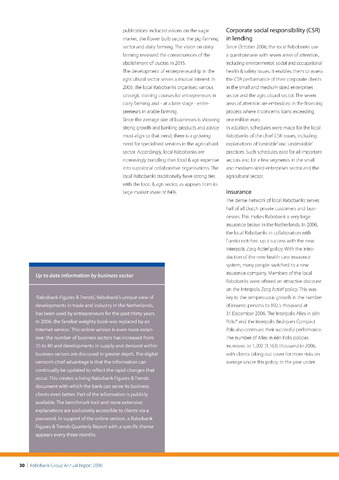Corporate social responsibility (CSR)
in lending
Insurance
publications included visions on the sugar
market, the flower bulb sector, the pig-farming
sector and dairy farming. The vision on dairy
farming reviewed the consequences of the
abolishment of quotas in 2015.
The development of entrepreneurship in the
agricultural sector serves a mutual interest. In
2006, the local Rabobanks organised various
strategic training courses for entrepreneurs in
dairy farming and - at a later stage - entre
preneurs in arable farming.
Since the average size of businesses is showing
strong growth and banking products and advice
must align to that trend, there is a growing
need for specialised services in the agricultural
sector. Accordingly, local Rabobanks are
increasingly bundling their food agri expertise
into supralocal collaborative organisations. The
local Rabobanks traditionally have strong ties
with the food agri sector, as appears from its
large market share of 84%.
Up to date information by business sector
'Rabobank Figures Trends', Rabobank's unique view of
developments in trade and industry in the Netherlands,
has been used by entrepreneurs for the past thirty years.
In 2006, the familiar weighty book was replaced by an
Internet version. This online version is even more exten
sive: the number of business sectors has increased from
75 to 80 and developments in supply and demand within
business sectors are discussed in greater depth. The digital
version's chief advantage is that the information can
continually be updated to reflect the rapid changes that
occur. This creates a living Rabobank Figures Trends
document with which the bank can serve its business
clients even better. Part of the information is publicly
available. The benchmark tool and more extensive
explanations are exclusively accessible to clients via a
password. In support of the online version, a Rabobank
Figures Trends Quarterly Report with a specific theme
appears every three months.
Since October 2006, the local Rabobanks use
a questionnaire with seven areas of attention,
including environmental, social and occupational
health safety issues. It enables them to assess
the CSR performance of their corporate clients
in the small and medium-sized enterprises
sector and the agricultural sector. The seven
areas of attention are embedded in the financing
process where it concerns loans exceeding
one million euro.
In addition, schedules were made for the local
Rabobanks of the chief CSR issues, including
explanations of 'desirable' and 'undesirable'
practices. Such schedules exist for all important
sectors and for a few segments in the small
and medium-sized enterprises sector and the
agricultural sector.
The dense network of local Rabobanks serves
half of all Dutch private customers and busi
nesses. This makes Rabobank a very large
insurance broker in the Netherlands. In 2006,
the local Rabobanks in collaboration with
Eureko notched up a success with the new
Interpolis Zorg Actief policy. With the intro
duction of the new health care insurance
system, many people switched to a new
insurance company. Members of the local
Rabobanks were offered an attractive discount
on the Interpolis Zorg Actief policy. This was
key to the tempestuous growth in the number
of insured persons to 102.5 thousand at
31 December 2006. The Interpolis Alles in één
Polis® and the Interpolis Bedrijven Compact
Polis also continued their successful performance.
The number of Alles in één Polis policies
increased to 1,202 (1,163) thousand in 2006,
with clients taking out cover for more risks on
average under this policy. In the year under
30 Rabobank Group Annual Report 2006

